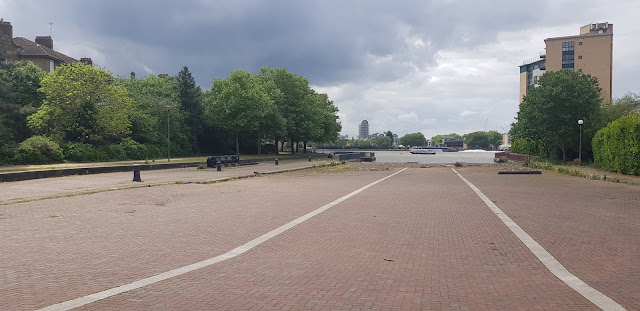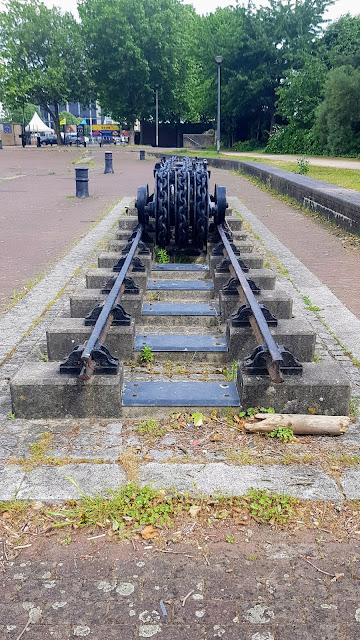 |
| Hydraulic ram. |
Historic places can be easily missed, even when walking the streets and roads of London.
It was while wandering along Westferry Road, on the Isle of Dogs, that I found what looked like a car park and an ordinary entranceway to the River Thames.
 |
| At first glance it looks like a simple slipway. |
What made me stop were the bollards at the top of the ramp. These weren't your typical car park bollards, but ones that I have seen countless times near docks and mooring sites. So, I decided to take a closer look.
Heading down the slipway I saw some obviously old machinery, to my left. On closer inspection I discovered that this was a hydraulic ram, once used for closing the long disappeared lock gates.
 |
| Hydraulic ram. |
The ramp itself was modern, although, as I approached the foreshore, a portion of the old ramp could be seen almost completely covered by sand, rubble and pieces of clay pipes that litter London's beaches.
After taking numerous photographs, and making sure that I hadn't missed anything, I continued my walk south along Westferry Road.
Brief History
The Millwall Slipway was once the entrance to the Millwall Docks, which were primarily used for grain and timber imports.
When this slipway was a lock it was the largest lock in London. It had a width of 24 m (80 ft) with chamber 75 m (247 ft) and 60 m (198 ft) in length. Its depth was 7 m (23 ft) at the sides and, in the centre, 8.5 m (28 ft) at high tide. Its wrought-iron gates were each almost 13 m (42 ft 3 in) wide, 10 m (34 ft) in height and weighed roughly 60 tons.
 |
| Hydraulic ram. |
Originally the gates were operated by hydraulically powered windlasses, but these were replaced, in 1875, by hydraulic jiggers. Two 3-ton capstans were replaced with direct-acting, double-headed capstans, in 1906. Three more hydraulic capstans were supplied by the same firm in 1910.
In September 1940 the entrance lock, middle gates and part of the south wall were badly damaged by the Luftwaffe. Plans to reconstruct the lock were proposed, in 1949, but costs led to the eventual damming of the Outer Dock, in 1956. Following a decade of considerations to the rebuilding of the lock, it was finally closed in 1967, when its east end was filled in.
Over the next two decades the entranceway was left to silt up, until the late 1980s, when the London Docklands Development Corporation filled it in, leaving just a slipway.
Following some landscaping of the lock entrance one of the hydraulic jiggers, from the middle-gate, was mounted on display for all to see.
 |
| Plaque. |
Millwall Dock old lock entrance.
part of former
hydraulic ram for closing
the lock gates
refurbishment completed November 1990
sponsored by LDDC
contractor M J Cagney
landscape designer Paddy Jackson
No comments:
Post a Comment